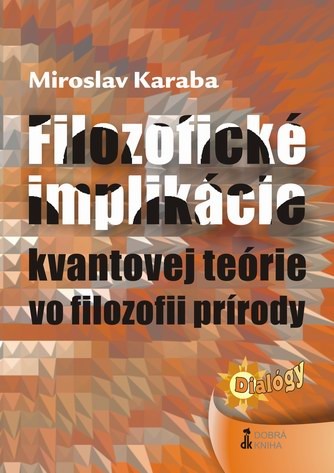The aim of this work is to attempt an approach of philosophical implications and chosen outcomes of the quantum theory in the philosophy of nature (philosophy of science). Nowadays the humankind is living through a period, in which we are followed (and sometimes even haunted) by science and its products. The development of the modern exact science taking place since the era of Galileo and Newton has fuelled a great boom of technological civilisation. However, at the same time, it has caused creation of a certain gap between matter and spirit. At the beginning of the 20th century many complications appeared, as it were, in connection with notions such as matter, space, time and energy, which led to the loss of certainty based on old, orthodox and commonly used premises. Nevertheless, the actual state of scientific research keeps increasing the distance between us and the contrast formed between man and world of nature.
Internally, our work is structured into seven main chapters delimitated by an introduction and a summary. Scrutinizing the present issue, it has proved to be necessary to know historical aspects of changes under way in science and, in addition, following its own methods to recognize the nature, meaning and consequences of such changes for science itself.
Therefore, the first three chapters deal with the review of evolution of thought pertinent to philosophy of nature, starting from the times of seeking for the fundamental unity of the primordial principle, as it can be found in the philosophy of the Greek antiquity, to the developed systems of the Middle Ages, to the premises of natural philosophy based on the development of classical physics in modern history. The intent of this part of work does not consist in an attempt at a ‘complete’ review of the history of philosophy, or of the history of natural philosophy, respectively, which would not be conceivable considering the extent of the present work. Hence it contains only some key ideas and currents of thought which I deemed interesting and relevant to the topic of this work.
The second part of the work (chapters four to seven) treats the quantum theory itself, the process of transition from the classical physics to quantum mechanics at the beginning of 20th century, some related problems (e.g. EPR paradox, the measurement problem, hidden parameters), interpretations of the quantum theory (e.g. that of Copenhagen, Bohm, Kochen–Dieks–Healey, the interpretation of multiple worlds) as well as its philosophical implications. In the whole work we can survey the juxtaposition of particular concepts and their implications in the classical physics and in the quantum theory. Subsequently, the result of the work presents also a sketch of changes in our perception of the world as a consequence of new science and its interaction with other fields of human culture.
Finally, the last part of the work contains the list of bibliographical references, where the author have managed to collect a large number of relevant publications and single articles, mostly written in English. Apart from that, a textual appendix is attached to the work.
The research method of the present work can be defined as inductive. At the same time it is applied to partial philosophical implications with the effort to capture and, in turn, to rationally analyze the established picture of the world. The aim of the work is to prove that the shift from the ‘classical’ to the ‘modern’ natural science, which started in the field of physics at the turn of 19th and 20th century, has conveyed a qualitative change of metaphysical premises and imaginative contents of our minds. Moreover, the new scientific conceptions have definitely discredited the old-fashioned mechanistic materialism and brought new stimulations and possibilities for Christian scientists and theologians concerned with mutual relations between science and religion.
Though the work strives to give answer to some crucial questions about the relation between our perception of the world and the fundamental, all-comprising reality, it does not claim to be complete. On the contrary, it poses and raises old questions in a new manner, putting stress on the present-day relation of natural sciences with philosophy and theology.
Edícia: 1.
EAN: 9788071415732
ISBN: 978
Vydavateľstvo: Dobrá kniha
Autori: Miroslav Karaba
Rok vydania: 2009
Počet strán: 256
Väzba: brožovaná väzba
Rozmer: 17 x 24
Jazyk: Slovenský



